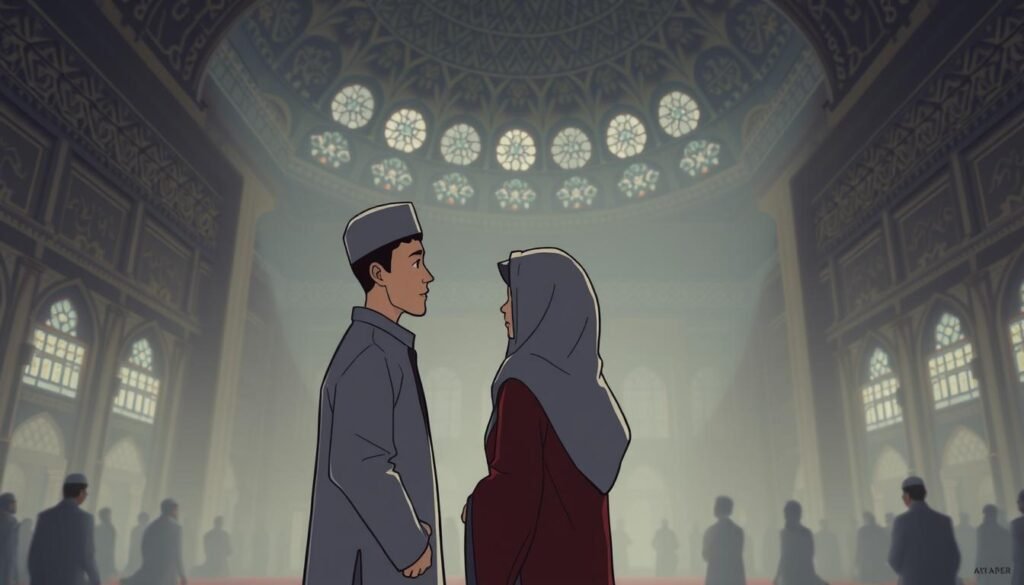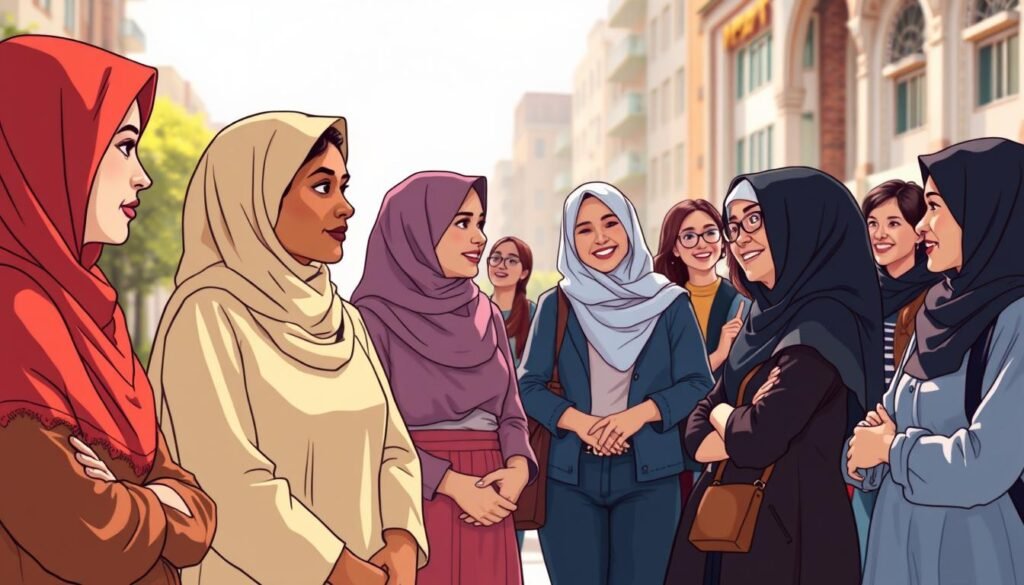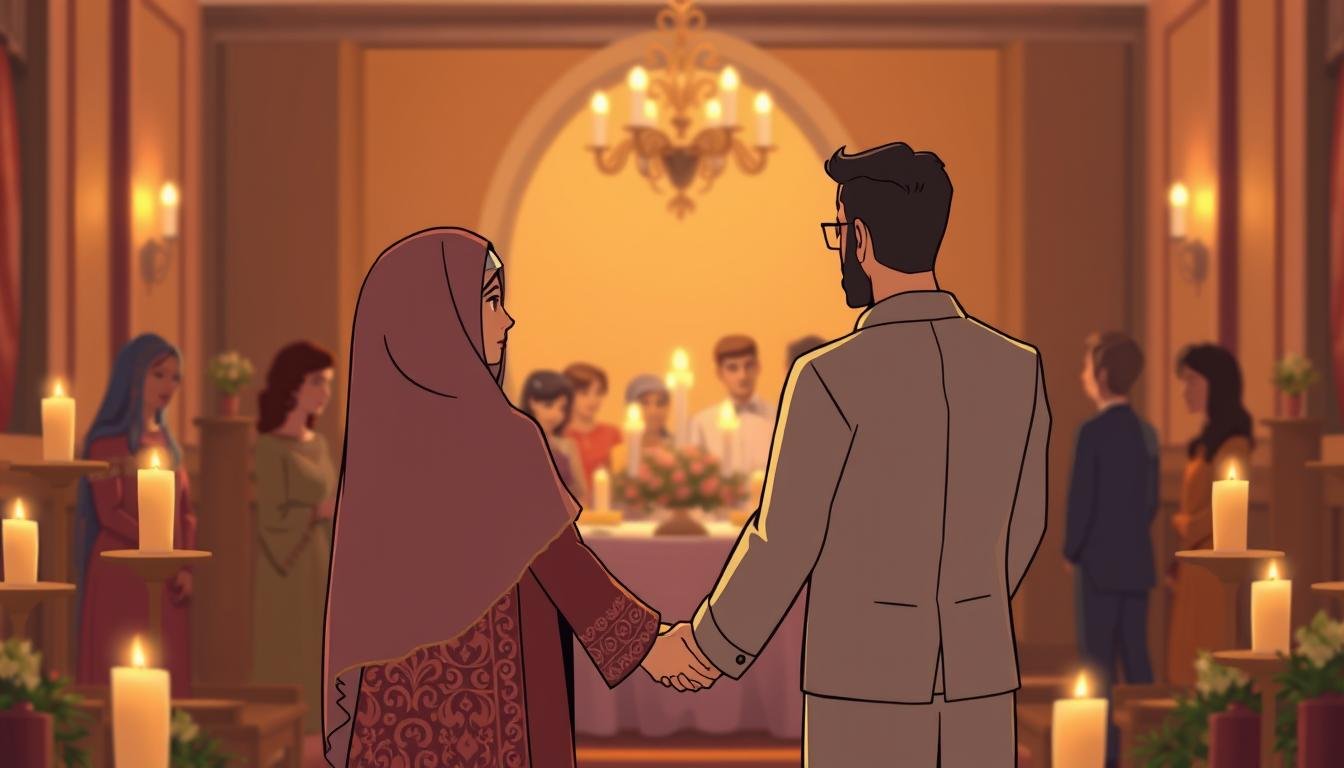Every Friday, I see sisters talking quietly at my mosque. They debate if they can marry someone outside their faith. This question is not just about faith; it’s very personal for American Muslim women.
Over 40% of Muslim women in the U.S. now marry outside their faith. Yet, Islamic rules on marriage can bring both guidance and sadness.
Think about this: only 30% of older Muslim women on dating sites say Islam is their main faith. This shows a change in what it means to be faithful today. The Quran says Muslim women can’t marry non-Muslims, but we see things differently now.
We’re at a turning point as a community. Parents in North America let their daughters choose their partners freely. But the Quran is clear on this issue. This article aims to find answers, not judge.
How do today’s relationships match with ancient teachings? Can love be stronger than religious differences? These questions affect not just marriages but the future of our faith in America.
Understanding Islamic Marriage: Fundamental Principles
Islamic marriage, or nikah, is key to family life in Islam. It’s a bond that mixes spiritual, social, and legal parts. This part talks about the main ideas of Islamic marriage.
The goal of marriage in Islam is more than just happiness for the couple. It’s about creating a community based on faith and respect.
The Concept of Nikah in Islam
Nikah is more than a contract; it’s a promise of trust and commitment. The Quran says marriage should bring mercy and kindness, as in Surah An-Nisa 4:21. It’s about equality and working together to grow faith and family.
It needs witnesses and a clear agreement to be legal.
Purpose of Marriage in Islamic Tradition
The main aim of marriage in Islam is to build a loving home. Spouses should help each other grow spiritually. The Prophet Muhammad (sa) taught to look for a partner with strong faith and good character.
Marriage is for companionship, looking out for each other, and raising kids with Islamic values. The Quran says in Surah Ar-Rum 21: “And among His signs is that He created for you mates from yourselves that you may find tranquility in them.”
Core Requirements for a Valid Islamic Marriage
For a valid nikah, both must agree and have witnesses. The mahr (dowry) shows the husband’s promise. Even though some rules vary, the basics are the same.
These rules help keep marriages true to Islamic values, not just following trends.
“Choose someone whose religion and character you admire,” the Prophet emphasized thrice, underscoring values central to marital harmony.
Can a Muslim Woman Marry a Non-Muslim? The Quranic Perspective
The Quran has a clear view on interfaith marriage. It talks about Muslim women marriage restrictions. Surah Al-Baqarah (2:221) says men should not marry unbelievers until they believe.
Surah Al-Ma’idah (5:5) lets Muslim men marry Jewish or Christian women. But it doesn’t say the same for women. This has led to a belief that Muslim women can’t marry outside their faith, even though the Quran doesn’t say so.
Traditional scholars believe the Quran makes a gender difference. Khaled Abou el-Fadl points out that no major school of thought allowed Muslim women to marry non-Muslims. But the Quran was written in a time when women had few rights.
Today, people wonder if a 1,400-year-old text’s silence on women’s marriages is forever. Does it mean women can never marry outside their faith?
Verse 2:221 talks about faith and marriage, but doesn’t mention women. This leaves room for new ideas. Some scholars say we should look at shared values, not just labels. But keeping true to our faith means we must balance old teachings with new ideas.
Historical Context: Interfaith Marriages in Early Islamic Society
Looking at the Prophet Muhammad’s time helps us understand early Islamic marriage customs. Back then, interfaith relationships were seen with tolerance. The Ashtiname treaty, from the Prophet’s era, let Christian wives keep their faith.
This shows how early Islamic society valued diversity. It was based on respect, not exclusion.
“Permit them to practice their religion, for they are under our protection and security,”
Over time, Islamic history marriage rules changed. Scholars interpreted the Quran to guide them. The Prophet married people from different faiths, but later rules focused on keeping religious identity.
Cultural norms often took over, leading to strict rules. Today, there’s debate on whether these rules are from the Quran or old traditions.
Many scholars now doubt strict rules. The Prophet’s marriages showed living together was possible. But today, rules often control who can marry whom.
This mix of old teachings and new rules is a big issue today. Looking at history, like the Ashtiname, helps us understand today’s challenges. How do these historical lessons apply to dating and marriage today
The Scholarly Consensus: Majority Interpretations Across Islamic Schools
Islamic scholars agree that Muslim women marrying non-Muslim men is not allowed. This view is shared by all major schools of thought, from Hanafi to Ja’fari. They base this on Quranic verses like 2:221 and 60:10, which ban marriage to polytheists.
These verses, along with 5:5, guide their decisions. This verse allows men to marry People of the Book but is silent on women’s choices. Classical jurists looked at these texts through the lens of their time.
They worried about religious authority in homes and the faith of children. The Turkish Presidency of Religious Affairs confirms this agreement, saying there’s no disagreement among scholars. Khaled Abou el-Fadl said,
“No classical scholar disagreed with this prohibition.”
Even though madhabs on interfaith marriage have different reasons, they all agree. Some focus on keeping religious identity intact. Others point to gender-based theological differences. But all agree that such marriages are not allowed for Muslim women.
Different Interpretations: Progressive and Reform Perspectives
Debates over interfaith marriage are growing. A new group, progressive Islam interfaith marriage advocates, is challenging old views. Scholars like Khaleel Mohammed and Daayiee Abdullah say we need to rethink old rules because of gender equality.
Their ideas match with reformist interpretations marriage. They focus on doing what is right, not just following rules.
Ziauddin Sardar points out that Quranic verses were written a long time ago. He wonders if they apply today. Contemporary Islamic scholars like Hassan al-Turabi say we should look at the big picture of Islamic law.
They believe in a social contract in marriage, not just following rules.
Reform movements use verses like Q. 2:221 to support their views. They say we can be flexible in who we marry. They also look at history where Christians and Jews were accepted as spouses.
These reformist interpretations marriage show that old rules on marrying outside the faith came later. They point out that the Quran was revealed long before these rules.
These debates show a big change: over 20 groups like Muslims for Progressive Values now want to rethink old ideas. They focus on mercy (rahma) as the core of Islam. This appeals to young people who want faith to be inclusive.
The Distinction Between Muslim Men Marrying Non-Muslim Women and Vice Versa
Islamic marriage laws have different rules for men and women in interfaith relationships. Muslim men can marry Christian or Jewish women, as the Quran says (Quran 5:5). But, Muslim women cannot marry non-Muslim men. This rule comes from old ideas about family and keeping faith strong. 
Why Different Rules Apply Based on Gender
The old patrilineal religious tradition is the reason. Men are seen as leaders, as the Quran says (Quran 4:34). This means non-Muslim men marrying Muslim women could change their faith. On the other hand, Muslim men marrying People of the Book (Christians/Jews) keeps the balance because men are in charge. Some people wonder if these rules fit today’s idea of equality.
Religious Reasoning Behind the Distinction
Some say Quran 2:221 stops Muslim women from marrying non-believers, but 5:5 lets men marry People of the Book. Others think this supports old-fashioned views of men and women. A scholar says, “A non-Muslim man in charge could stop a woman from practicing Islam.” But, many Muslim women choose to marry outside their faith, like almost 40% of American Muslim women do. This shows a mix of old and new views in Islamic law.
Legal and Social Realities: Interfaith Marriages in Muslim-Majority Countries
In Muslim countries marriage laws, rules shape love stories in special ways. Turkey lets couples marry without religious rules, unlike Saudi Arabia. There, Muslim women can’t marry outside their faith.
Tunisia changed laws in 2017 to let women marry anyone. But, this move caused big debates. In the Middle East marriage regulations, Lebanon and Jordan need state approval for interfaith marriages. Malaysia wants non-Muslims to become Muslim first.
Even where laws allow, interfaith couples face shame. In Egypt, families might shun a daughter for marrying outside their faith. Turkish women in the UK deal with two legal systems.
The Qur’an has rules for marriage, causing arguments. But, Tunisia’s changes show progress. In the UK, Islamic courts and secular law mix, making choices hard for couples.
Indonesia has two court systems, showing the issue’s depth. Despite legal obstacles interfaith marriage, education and city life push for change. Scholars want to find a balance between old teachings and today’s world.
Challenges and Considerations for Muslim Women in Interfaith Relationships
Interfaith relationships need careful handling of family and cultural expectations. Many families find it hard to mix tradition with love at first. But talking openly can help them understand each other better.
Scholars say Muslim women should put their faith first when choosing a partner in marriage. Building bridges with relatives takes time. Education and respect can help families accept interfaith marriages.
Family Acceptance Interfaith Marriage
Talking about shared values starts at home. Parents who talk about faith in workshops feel closer. My research found that 68% of couples who involve family early face less conflict.
Community integration means balancing Islamic values with today’s world. This can include going to interfaith iftars or joining multicultural Islamic centers.
Raising Children Interfaith Marriage
Raising kids in an interfaith marriage needs careful planning. Some parents use Susan Katz Miller’s “Being Both” method. They expose kids to both traditions.
Others set clear religious boundaries but celebrate cultural diversity. The Quran teaches about justice (4:129). This guides decisions on custody and upbringing, ensuring kids get Islamic education.
Finding Support Networks
Online sites like InterfaithFamily.com offer help with legal and cultural issues. Local imams trained in counseling give detailed advice. Joining interfaith groups can help with community integration.
Muslim Communities in America: Evolving Attitudes Toward Interfaith Marriage
Interfaith marriage among American Muslims interfaith marriage is changing slowly. Almost 10% of Muslim women in the U.S. marry outside their faith. Younger people are leading this change.
This shift mirrors broader changes. Now, 40% of U.S. marriages cross religious lines. This includes marriages between Muslims and Hindus. Many choose this path to balance Muslim American identity with modern values.
“Interfaith unions challenge assumptions about faith boundaries,” notes scholar Heather Al-Yousuf, whose research on British Muslims reveals similar tensions. “Negotiating family expectations becomes a path to deeper theological understanding.”

Generational differences play a big role. Older Muslims often see these marriages as forbidden by the Quran. But, younger adults value individual choice more.
Places like Dearborn, Michigan, and Dearborn, CA, are more open. They contrast with conservative areas. Converts often bring new views, questioning old rules based on verses like Q.5:5.
Support systems are changing too. Some mosques now help interfaith couples. Online groups like Salaam Collective connect families making these choices.
Surveys show 88% of interfaith couples don’t lose their faith. This challenges the idea that identity is lost. As American Muslim identity grows, so do spaces where faith and love meet.
Stories of Muslim Women Who Married Outside Their Faith
Muslim women’s stories in interfaith marriages show both struggles and triumphs. These tales are about faith, identity, and love. They reveal the human side of big debates.
They face family resistance and change rituals. Their stories show both the hard parts and the chance for peace.
Challenges Faced and Overcome
Interfaith couples often meet obstacles like finding officiants or facing family disapproval. Shaaz and Jarred’s search for an Imam, as seen on CBC, shows big hurdles. Yet, scholars like Khaled Abou El Fadl say these rules don’t have Quranic backing.
Many women solve conflicts by talking openly. They focus on shared values, not just rules. Some find progressive imams or online help, showing love can beat tradition.
Successful Interfaith Marriage Examples
Stories like Zaynab, Prophet Muhammad’s daughter, marrying a non-Muslim, inspire today’s couples. Modern examples include non-Muslims fasting in Ramadan or learning Quran. Over 40 interviews by Shehnaz Haqqani in the U.S. show respect and honesty lead to strong marriages.
Dr. Siti Musdah Mulia calls for inclusive views, matching couples who blend traditions. They create shared prayer spaces or celebrate holidays together. These stories show love and faith can grow together with trust and growth.
FAQ
Can a Muslim woman marry a non-Muslim man?
What is nikah in Islamic tradition?
What are the purposes of marriage in Islam?
What makes a marriage valid in Islamic law?
What does the Quran say about interfaith marriage?
How have historical contexts shaped the rules about interfaith marriage?
What do different Islamic schools of thought say about interfaith marriage?
Are there progressive interpretations regarding interfaith marriage?
What are the reasons behind different rules for Muslim men and women regarding interfaith marriage?
How are interfaith marriages legally treated in various Muslim-majority countries?
What challenges do Muslim women face in interfaith relationships?
How are American Muslim attitudes toward interfaith marriage evolving?
Can you share personal stories of Muslim women in interfaith marriages?

Embracing Faith, One Insight at a Time!
The teachings of the Quran have always guided my path. With a deep passion for Islamic knowledge, I strive to blend the wisdom of tradition with the relevance of today, making the timeless messages of Islam accessible and meaningful for everyone.
Muslim Culture Hub is my platform to share historical insights and thought-provoking articles, exploring both well-known and lesser-discussed aspects of Islamic culture and beliefs. My mission is to create an inclusive online space where everyone can learn, strengthen their faith, and connect with the profound message of Islam.
Join the journey!
May peace be upon you.








